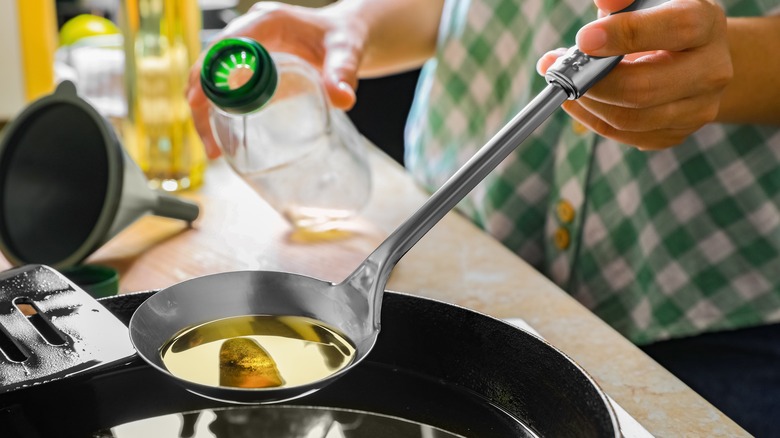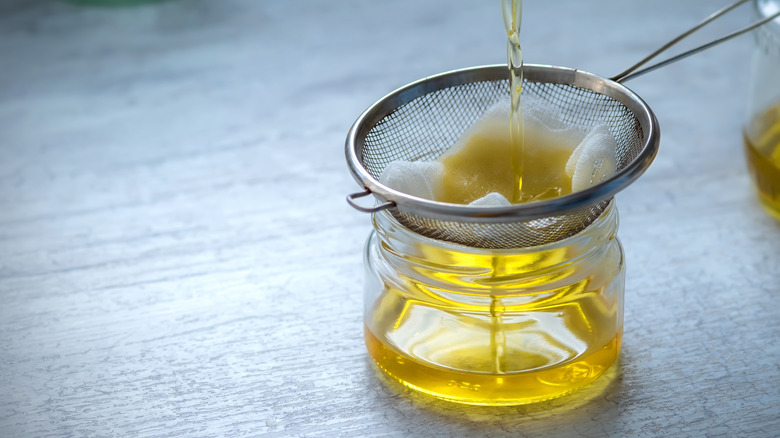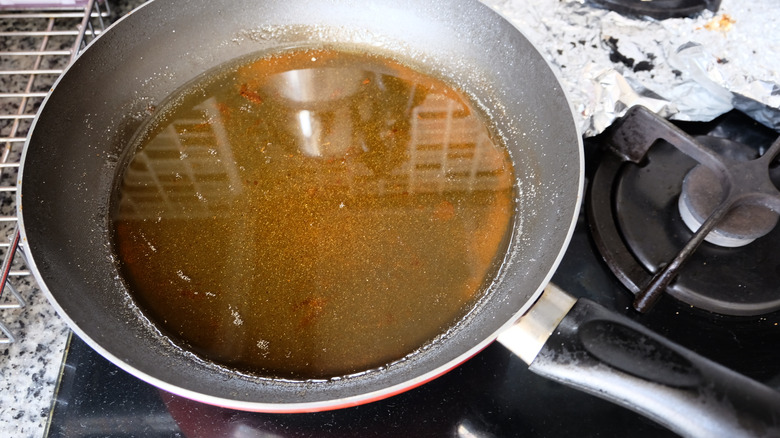Can You Reuse Fry Oil?
Deep frying food produces a flavor like nothing else but comes with a few catches: It's messy, dangerous, inconvenient, and takes a lot of oil. Pouring an entire bottle of oil into a pot or a deep fryer almost always feels wasteful and can get expensive, too. Plus, what are you supposed to do with the leftover oil when you're done?
Well, don't pour it out — it's not supposed to go down the drain anyway. Instead, consider storing it away for future use. Some might balk at the idea, questioning whether reused oil is safe or sanitary, but many people, from pro chefs who believe that lightly-used oil imparts extra flavor to resourceful grandmas who hate waste, swear by it.
While the waste produced by your kitchen is nothing compared to an upended oil tanker, cooking oil can still clog waterways and harm wildlife. However, the naysayers have a point: Reusing oil can pose health concerns. According to a 2016 study published in the journal Toxicology Reports, vegetable oil repeatedly heated to the smoking point could cause cancer, heart disease, and other ailments. Ultimately, whether or not you reuse oil is a personal choice, but if you decide to keep it around, take steps to do it safely.
How to reuse frying oil
Colombia University's health education website, Go Ask Alice, explains that the chemical composition of oil starts to change at 375 degrees Fahrenheit. It's this change that makes reheated oil unhealthy. There are ways to reduce the risk, though: choosing your oil wisely, straining it after each use, and storing it correctly can all help.
You might assume that, since oil starts to degrade at the smoke point, you should use a high-heat oil like grapeseed or sunflower oil. You'd be wrong: These oils are high in polyunsaturated fats, which are harmful when they start to degrade. Consider olive oil instead. Studies from Food and Chemical Toxicology and Acta Scientific Nutritional Health both showed that olive oil was stable and didn't degrade easily under high heat. Healthline notes that olive oil is one of the healthiest oils to use, and yes, despite what you may have heard, you can use it for deep frying. Olive oil smokes at around the same temperature as canola oil, a popular choice for deep frying, and won't impart too much flavor. You still might not want to use it for donuts, though, so opt for another oil high in monounsaturated fats like canola.
Whichever oil you decide to use, use a food thermometer to keep tabs on the temperature. Heat it to around 325 degrees Fahrenheit before dropping the food in, then make sure that it stays between 250 and 325 degrees throughout the cooking process.
How to filter oil
So, you've just finished frying a batch of french fries, hushpuppies, or beignets. Now what? First things first: make sure that the oil is safe to handle before trying to put it away. Take the oil off the burner immediately — remember, heat makes oil degrade faster — and scoop out the biggest chunks of debris with a slotted spoon or strainer. Then, cover it, let it cool completely, and don't rush the process. While oil can take hours to fully cool, a potful of hot oil is a dangerous thing; let it sit overnight if needed.
Once the oil is fully cooled, it's time to clean it. Cleaning oil with gelatin is easy and mess-free, but if you don't have any gelatin on hand, you'll need to filter it. A mesh strainer is better than nothing, but, ideally, you should line it with cheesecloth or a coffee filter to catch the smallest particles. America's Test Kitchen compared oil used for fried chicken against oil used for french fries: Breaded and battered foods tend to leave behind debris, which makes the oil degrade quickly, while oil used for fries or potato chips will last much longer.
How to store used frying oil
Pour the frying oil back into the container it came from, using a funnel if necessary, or store it in an airtight jar. Sure, you can stick used frying oil back on the shelf, but it's not necessarily the best idea. Over time, used oil can oxidize if it's exposed to too much light or heat. While it's fine to store oil in a dark cabinet short-term, it's better off in the freezer or refrigerator if you're not planning on using it again soon. It's totally okay to reuse oil after it's been frozen, but, depending on the type of oil, you may need to unthaw it first.
Re-use your oil wisely. Flavors, especially strong flavors, can leech into oil. In other words, use fresh oil for frying doughnuts rather than reaching for oil that was used for jalapeño poppers. That extra flavor isn't always a bad thing: Savory foods, like fried chicken, might benefit from that extra hint of pepper. Even so, you shouldn't mix oils that have been used for different things together. Keep them in separate containers and add labels to keep track.
When to throw frying oil out
Overused oil isn't just harmful to your health — it can make your food taste nasty. As the oil degrades, you might start to notice a rancid taste and soggy texture.
There's no handy guide to tell you exactly how many times you can reuse frying oil. All oil goes bad eventually, but when it goes bad can vary a lot. The type of oil you use, your storage methods, and the temperature you're cooking at can all make a difference. Deep fryers keep oil fresh for longer than frying pans, and the type of food has an impact, too. No need for complicated calculations, though. Go by your senses: Turned oil has a dark color, thick texture, and rancid smell. You may notice food residue or a bubbly appearance.
The absolute best way to dispose of used cooking oil is to bring it to a recycling facility so that it can be used yet again as biodiesel fuel to power trucks and homes. That's not always an option, though. If you live too far from a facility — or simply don't have the time — oil solidifiers offer another eco-friendly alternative. As a last resort, you can go the old-fashioned route and throw it out with the trash in a tightly sealed container.




